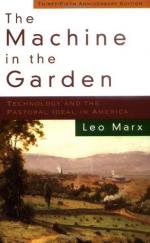
|
| Name: _________________________ | Period: ___________________ |
This test consists of 15 multiple choice questions and 5 short answer questions.
Multiple Choice Questions
1. What feeling characterized the beginning of Mark Twain's writing career?
(a) Lamentation about the death of Indian cultures.
(b) Nostalgia for the old days on the Mississippi.
(c) Optimism about industrial expansion into the midwest.
(d) Fear about the consequences of the railroad.
2. What has happened to the ideal of the pastoral society, in Marx's opinion?
(a) It is a governing principle.
(b) It has replaced the industrial utopia.
(c) It is a token belief.
(d) It has become the rallying cry for opposition to industrial modernism.
3. Who was Tench Coxe?
(a) A Philadelphia merchant.
(b) A Boston statesman.
(c) A Philadelphia inventor and statesman.
(d) A New York financier.
4. Which school of criticism does Marx belong to?
(a) New Historicism.
(b) Psychoanalytic criticism.
(c) New Criticism.
(d) Deconstruction.
5. How did Coxe's vision for industrialism intersect with pastoralism?
(a) Coxe thought that factories would blight the landscape.
(b) Coxe prophesied that extractive industries would ruin the landscape.
(c) Coxe thought that America's environment would make the factory a pastoral place.
(d) Coxe predicted that industries would leave dead places in the environment when they collapsed.
6. How does Marx describe the pastoralism of the 19th century?
(a) Romantic.
(b) Sentimental.
(c) Modern.
(d) Industrial.
7. How would you describe Marx's book 'The Machine in the Garden'?
(a) Political.
(b) Scientific.
(c) Academic.
(d) Prophetic.
8. What feature of modern society came into existence with American industrialism?
(a) Laissez-fair class structure.
(b) Unionization.
(c) Strikes and riots.
(d) Total warfare.
9. What skill did Twain idealize?
(a) The Indian soldier's warfare.
(b) The engineer's ability to bridge rivers.
(c) The steam locomotive engineer's control over the train.
(d) The riverboat pilot's knowledge of the river.
10. How did Melville describe whaling?
(a) As a symbol of society.
(b) As an art.
(c) As an industrial enterprise.
(d) As a spiritual calling.
11. How does Marx characterize man's hopes for nature?
(a) Realistic planning.
(b) Scientific resource allocation.
(c) Pastoral idealism.
(d) Consensus-based resource use.
12. How did Thoreau describe modern man?
(a) Free in the wilderness.
(b) Poised at the boundary between nature and industry.
(c) Unhappy in factories.
(d) Torn apart by his desires.
13. What did Emerson's philosophy ultimately propose?
(a) Reconciliation of industry and nature.
(b) Domestication of nature.
(c) Rejection of industry.
(d) Urbanization of nature.
14. How did Americans see westward expansion, in Marx's account?
(a) As a crime against Indians.
(b) As a destruction of the landscape.
(c) As a form of progress.
(d) As a form of corruption.
15. What would manufacturing do for America, in Coxe's estimation?
(a) Drive western expansion.
(b) Ensure independence.
(c) Unify the electorate.
(d) Generate wealth.
Short Answer Questions
1. What type of society was America (in the time of Marx's writing)?
2. What does Ishmael symbolize, in Marx's interpretation of Moby Dick?
3. What does modern man hope for, in spite of industrialism?
4. What symbolic statement does Marx say Twain made in the raft being destroyed in Huckleberry Finn?
5. What effect does Marx say Emerson foresaw for industrialism?
|
This section contains 530 words (approx. 2 pages at 300 words per page) |

|




